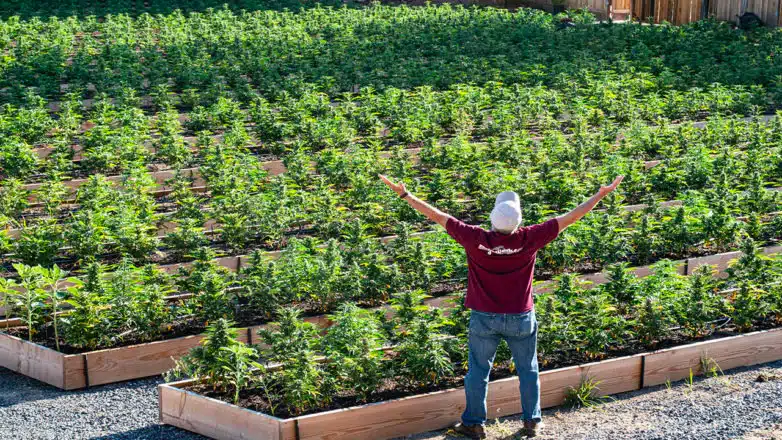Best Compost for Growing Autoflowering Cannabis

Choosing the right compost is one of the most important decisions that autoflowering cannabis growers can make. Autoflowering cannabis plants perform better under slightly different soil conditions than their photoperiod counterparts. While photoperiod plants require more nutrients, autoflowers are sensitive and prone to being overfed, and there is little margin for such error due to their extremely short growing time. Autoflowers prefer lightweight, aerated soil: this allows their roots to move quickly and easily through the growing medium as your plants grow, enhancing root penetration and nutrient absorption. pH levels must remain in the range of 6.2 to 6.5, as higher or lower acidity levels can harm your plants.
Though the task of finding the right soil for your autoflowering plants may seem daunting, there are plenty of autoflowering soil options for beginners and experienced growers alike. In this article, we cover three types of premade soils that are suitable for autoflowering plants. For those who would rather mix their own soil for autoflowers, we also provide the directions and recipe necessary to create your own soil and optimize your compost for your autoflowering cannabis to thrive.
Making Your Own Autoflowering Cannabis Soil
Many growers believe that autoflowers perform best when grown in a homemade blend that caters specifically to the needs of autoflowering plants. By mixing your own autoflowering cannabis soil, you can establish the following factors that are essential to any growing medium for autoflowering plants:
- Proper drainage
- Good water retention
- Balanced nutrient levels
- Aeration
In general, autoflowers perform best when potted in a hand-mixed soil designed especially for autoflowering cannabis. This is because autoflowering cannabis has slightly different soil requirements than typical cannabis plants. They prefer lightweight, aerated soil, and because they are slightly more sensitive, autoflowers do best with lower nutrient levels than one might use for their photoperiod counterparts. For the best possible results, we recommend mixing your own autoflowering cannabis soil. This allows growers total control over the level and type of nutrients that their autoflowers receive, while ensuring that your autoflowers aren’t overpowered by soils designed for photoperiod plants.
Creating your own autoflowering soil is easy, simple, and requires only a few basic ingredients: compost, peat moss, perlite, and vermiculite. You can create your own autoflowering cannabis soil using the provided ratios:
- 3 parts peat moss
- 3 parts compost
- 2 parts wet perlite
- 1 part wet vermiculite
These ingredients will blend into a lighter, more aerated soil with the ideal nutrient levels, and in the end, blending your own autoflowering soil may yield the best results.
Organic Soils and Organic Super Soil
Organic soils make an excellent option for those seeking a premade product that is easy to obtain. Brands such as Kind Soil offer premixed, organic ingredients and are rich in the nutrients necessary to nourish your autoflowering plants.
Some growers, on the other hand, prefer to mix their own Organic Super Soil. This involves amending an organic soil with ingredients that are known to promote healthy autoflower growth. These include compost, peat moss, and perlite. Compost and peat moss are especially important for autoflowering plants, while using perlite to promote proper water retention and drainage can maximize your yields. Below are the components of one popular recipe for creating your own organic super soil:
- 1 part compost
- 1 part peat moss
- 1 part perlite
Of the many ingredients that premixed soil contains, these three are by far the most important for autoflowering plants.
Premade Soils for Autoflowering Cannabis
Black Gold Soil
Over recent years, Black Gold Soil has become a trusted resource for cannabis growers seeking premium soil for potting their autoflowering plants. Black Gold Natural & Organic Potting Soil is certified organic, and has all of the features necessary to nourish your autoflowering cannabis plants. Black Gold Natural & Organic Potting Soil blends multiple types of fertilizers and nutrients including earthworm castings, organic fertilizer, perlite, and pumice.
Perlite is an especially desirable component of any pre-mixed soil for autoflowering plants; this lightweight soil additive has excellent water retention while promoting proper drainage, both of which are especially crucial for autoflowering cannabis plants. Perlite makes it easy for your plant to absorb the nutrients mixed into this premade soil blend, while it enhances the overall water retention necessary for them to thrive.
And Black Gold Soil is packed with many other nutritious ingredients, including pumice, organic fertilizer, and earthworm castings. This rich soil mix is an excellent option for those seeking a soil with optimum drainage, water retention, and nutrient variety to promote healthy plant growth.
Fox Farm Soil Ocean Forest Mix
Fox Farm’s Ocean Forest Potting Soil is the brand’s most popular product among cannabis growers. Created with aged forest products and sandy loam, this soil has the light, aerated quality that autoflowering cannabis plants love. Fox Farm’s Ocean Forest Mix contains a unique and highly effective mixture of ingredients including fish emulsion, crab meal, shrimp meal, composted forest humus, peat moss, worm castings, oyster shells, sandy loam, granite dust, Norweigan kelp, and more. Peat moss and compost are essential ingredients for autoflowering cannabis soil, making this the perfect potting mixture for your plants to thrive.
Conclusion
Though the premade soils we’ve mentioned above are certainly suitable options for your autoflowers, we recommend mixing your own autoflowering soil: in doing so, you can be sure to establish a growing medium that is specifically designed to promote the healthy growth of your autoflowering plants. The initial step of choosing your compost will have consequences that reverberate through your final yield: the best composts will optimize trichome production, guaranteeing a high-THC, cannabinoid and terpene-rich harvest.
